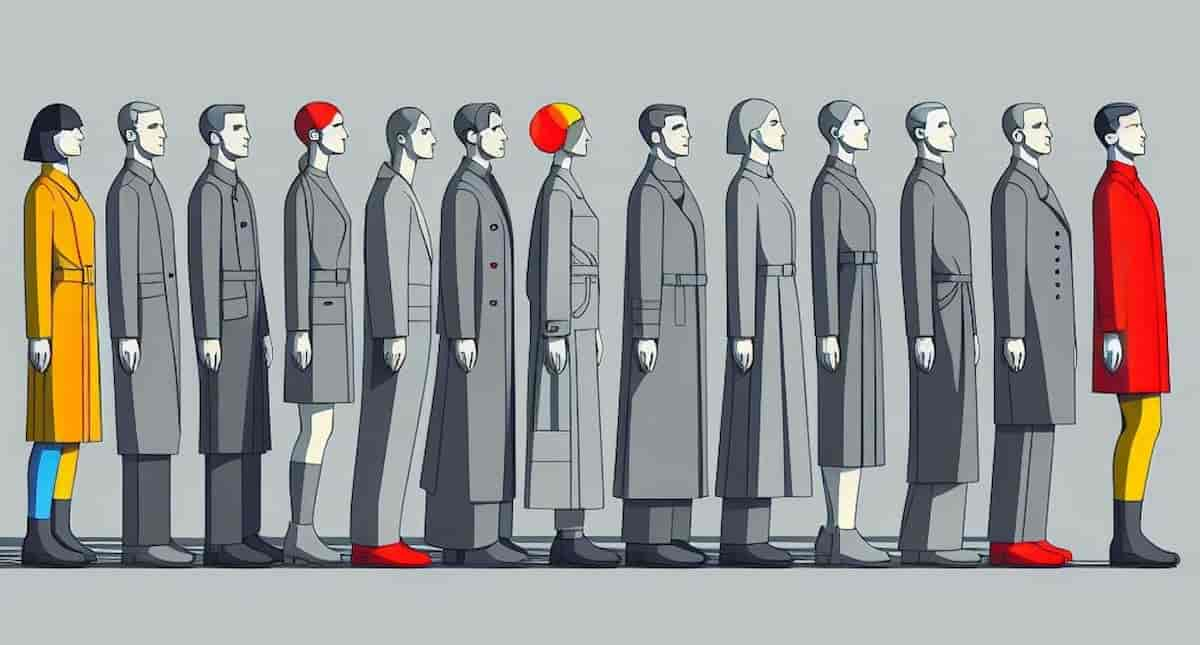Social conformity bias is a powerful psychological phenomenon where individuals change their behaviour or beliefs to align with group norms, often unconsciously.
Introduction to social conformity bias
Humans are inherently social creatures with a deep-rooted desire to belong and be accepted by their peers.
This fundamental psychological drive can lead us to modify our behaviours, opinions, and actions to match those around us, a phenomenon known as social conformity bias.
The tendency to conform is so deeply ingrained in human psychology that it often occurs without conscious awareness or deliberate intent.
Scientists have long been fascinated by this remarkable aspect of human behaviour, studying how and why individuals adjust their perspectives to fit within group dynamics.
The psychological foundations of conformity
Social conformity emerges from several key psychological mechanisms:
- Evolutionary survival instincts that prioritise group cohesion
- Neurological reward systems that activate when we feel socially accepted
- Cognitive processes that simplify complex decision-making
- Emotional needs for validation and belonging
Historically, conformity served crucial survival functions for our ancestors.
Individuals who maintained group harmony were more likely to receive protection, share resources, and increase their chances of reproductive success.
These ancient survival strategies continue to influence our modern social interactions in profound and often subtle ways.
Types of social conformity
Informational conformity
Individuals change their behaviour based on information provided by the group.
When faced with uncertainty, people often look to others for guidance, assuming collective knowledge is more reliable than individual understanding.
This type of conformity is particularly prevalent in ambiguous situations where clear information is lacking.
Normative conformity
This occurs when individuals modify their behaviour to gain social approval or avoid rejection.
The fear of standing out or being ostracised can drive people to suppress their true opinions and adopt group-sanctioned perspectives.
Social media platforms have amplified this dynamic, creating powerful echo chambers that reinforce collective beliefs.
Compliance
Compliance represents a surface-level conformity where individuals publicly agree with group norms while privately maintaining different views.
This strategic adaptation allows people to navigate social situations without genuine internal conviction.
Landmark experiments in conformity research
The Asch conformity experiments
Solomon Asch’s mid-20th century experiments dramatically demonstrated the power of group influence.
Participants were asked to match line lengths, with confederates deliberately providing incorrect answers.
Remarkably, approximately 75% of participants conformed to the incorrect group response at least once, revealing the profound psychological pressure to align with collective judgement.
Milgram obedience studies
Stanley Milgram’s controversial experiments explored how individuals might follow authority figures, even when instructed to perform unethical actions.
The studies revealed that most people would comply with instructions from perceived authoritative sources, highlighting the complex interplay between individual moral judgment and social conformity.
Real-world manifestations of conformity bias
Workplace dynamics
Organisational cultures often inadvertently promote conformity through unwritten rules and expectations.
Employees may suppress innovative ideas or critical feedback to maintain perceived professional harmony.
Consumer behaviour
Marketing strategies frequently leverage conformity bias by emphasising social proof and collective endorsement.
Testimonials, influencer recommendations, and popularity metrics trigger our innate tendency to follow perceived group preferences.
Political movements
Political ideologies often spread through powerful conformity mechanisms.
Individuals may adopt group political stances to maintain social belonging, sometimes overriding personal critical analysis.
Cognitive consequences of excessive conformity
- Suppression of individual critical thinking
- Reduced creativity and innovation
- Increased susceptibility to misinformation
- Diminished personal agency
- Potential erosion of authentic self-expression
Breaking the conformity cycle
Cultivate self-awareness
Regularly examine your beliefs and actions to determine whether they genuinely reflect your perspective.
Practice mindful reflection and question the origins of your opinions.
Seek diverse perspectives
Intentionally expose yourself to varied viewpoints and alternative interpretations.
Engage with individuals who challenge your existing beliefs constructively.
Develop critical thinking skills
Learn to evaluate information systematically, using logic and evidence rather than social consensus.
Practice asking probing questions and challenging assumed narratives.
Digital age conformity
- Social media algorithmic reinforcement
- Global digital echo chambers
- Instant social validation mechanisms
- Rapid information propagation
Understanding these digital conformity channels becomes increasingly important in maintaining individual cognitive autonomy.
Conclusion
Social conformity bias represents a complex psychological phenomenon deeply rooted in our evolutionary history.
While it serves important social functions, excessive conformity can limit personal growth and collective progress.
By developing awareness, critical thinking skills, and a willingness to respectfully challenge group norms, individuals can navigate social dynamics more authentically and effectively.
Key takeaways
- Social conformity is a natural psychological mechanism
- Multiple types of conformity exist
- Landmark experiments reveal powerful group influence dynamics
- Strategies exist to maintain individual thinking
- Awareness is the first step towards cognitive autonomy

